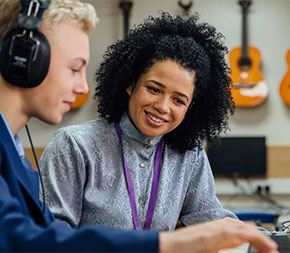Teaching the Arts: What It’s Like to Teach Music, Art, and Drama

by All Star Staff


A typical day for an art teacher might include helping kindergarteners construct masterpieces with construction paper and cotton-balls or teaching high school students how to mold and assemble mosaic sculptures.
Art education can be rewarding when watching students’ imaginations materialize. If you love sharing your knowledge of art history and love the idea of helping kids turn creative energy into works of art, consider studying art education.
With competitive salaries, comprehensive benefits packages and extensive vacation available for full-time teaching positions, it’s hard to find a more reliable, meaningful art career.
Music Teacher Education
Music teachers help students recognize and develop musical skills. A typical day might include teaching orchestra or working with different level choir groups at your high school. Music education majors learn various techniques to teach music and music appreciation to students of all ages.
Research has shown that music can be a healthy balance to a student’s general course curriculum and can actually help stimulate learning and development.* If you are thinking about becoming a music teacher, it’s important to have a musical ear, good communication skills and the patience to deal with students who have difficulty staying in tune, keeping a rhythm or reading music.
Learn more about music teaching careers in our music teacher career snapshot and check out our music teacher interview for a real-life example.
Drama Teacher Education
Drama teachers help encourage and motivate students to explore the artistic and expressive side of education through theater arts and performance. A typical day might include providing stage direction and set expertise for the high school musical, and working with the set designer and lighting crew to provide atmosphere.
Some students are natural performers who need a teacher to help them recognize their talent, while others are shy and benefit from seeing themselves perform even the smallest bits of dialog or movement on stage. If you love all the facets of theater production and enjoy teaching others, consider majoring in theater or drama education.
If the adrenaline of the lights, costumes and audience thrills you, you can find a lucrative and rewarding position as a drama teacher for students of any age. Since budget cuts around the turn of the century left drama programs intact at less than 20% of public elementary schools, you may have more luck in secondary or post-secondary schools where drama teachers with successful programs demand high salaries and community respect.
For more information on theater teacher careers, see our drama teacher career snapshot.
Sources: Beare, Kenneth. “Music in the Classroom.” Primedia; U.S. Department of Education, “Arts Education in Public Elementary and Secondary Schools”



